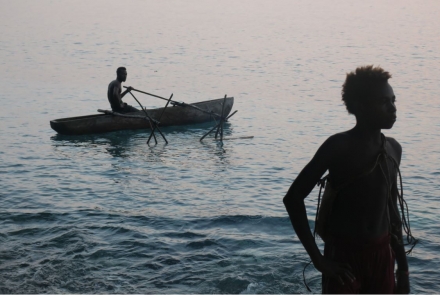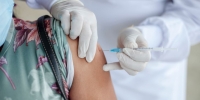
Photo by Ben Bohane, ANU
Pacific Wayfinder: PNG’s COVID-19 challenge
While much of the Pacific has kept the health impacts of the COVID-19 pandemic under control so far, Papua New Guinea still may not have reached the peak of the crisis, Ben Bohane writes for the Pacific Wayfinder series.
When Dr Henry Ivarature left his Port Moresby home earlier this year to move to Canberra, Papua New Guinea (PNG) seemed to have COVID-19 under control, but he remained worried.
“I could see that people weren’t wearing masks and social distancing. And there was very little testing going on,” he said.
Now, PNG is struggling to get on top of the situation, although health officials there claim the situation has stabilised. Official case numbers at the end of May were more than 15,000 total, with 162 deaths.
“With the current low level of testing, we really don’t know how big the problem is. I would assume the numbers we have are just the tip of the iceberg. And in saying that I think that we might not have reached the peak yet. When that will come, I’m not sure.”
In the beginning of the pandemic, the government applied strict lockdowns to supress the virus, but these measures didn’t last.
“It’s when they started to opening up and relaxing the lockdown – that’s when it picked up. Now they’ve gone into what they call ‘niupela pasin’ (new normal), which is basically learning to live with COVID” he said.
PNG’s approach reflects the difficulties faced in many developing nations where going into lockdown means denying many local workers a chance to earn their basic living – those living day to day. Lockdowns can be seen as something of a luxury available to wealthier countries where governments and citizens can afford to stay home with food on the table.
Still, large spikes in cases might present policymakers little choice but to lockdown, as both Fiji and PNG have found recently.
Limited health facilities are another challenge for PNG, and there are major logistical issues in distributing testing kits and vaccines across a large country to remote communities.
While vaccines are continuing to arrive in PNG from Australia and via the World Health Organization’s COVID-19 Vaccines Global Access (COVAX) program, a wave of misinformation in social media is creating vaccine hesitancy in the population – even among health workers. Dr Ivarature said less than half of the country’s nearly 5,000 health workers have had the jab so far.
“The virus is now in all the provinces, so they really need to get the vaccinates out, vaccinate the frontline workers and health workers quickly and start reducing the gap before it explodes.”
He suggested the best thing PNG’s neighbours, including Australia, can do to help is to assist with more testing of the population and even look at establishing a local lab that can return results quicker.
While PNG and Fiji both face a troubling situation, the rest of the Pacific continues to manage the crisis effectively, as head of the Public Health Division at the Secretariat of the Pacific Community (SPC) in Noumea Dr Paula Vivili said to this author recently.
“From a purely medical perspective I think the countries have done very well, the region has done very well. By and large we have a limited number of cases, just over 20,000 in the Pacific and a lot of those were in two countries – French Polynesia and Guam because the border control in those countries was a little bit more open than many others.”
Like Dr Ivarature, he wants to see more testing and the results available quickly, and locally. He thinks by middle of this year many countries will be able to process test results locally and hopes the epidemic will continue to push Pacific governments towards more investment in health infrastructure.
Dr Vivili believes the other challenges this year include dealing with mental health and the economic impacts of closed borders.
“Mental health and wellbeing is a significant challenge for many people and this is not limited to the Pacific by any means. There are still thousands of Pacific Islanders stuck overseas trying to get home even a year after the lockdowns,” said Dr Vivili.
Meanwhile, the economic shocks continue to be felt, requiring the region to develop economic strategies to get them through the crisis as quickly as possible. But for PNG, where the virus is circulating in the community and the vaccination rollout is slow, there will likely be no ‘post-COVID’ scenario for a while.
This article is from our new Pacific Wayfinder series, bringing you voices from the Pacific Island region. It is produced in conjunction with the Pacific Wayfinder podcast, produced by the Australia Pacific Security College.
Updated: 1 July 2024/Responsible Officer: Crawford Engagement/Page Contact: CAP Web Team












